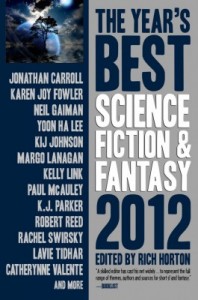“The Sighted Watchmaker” by Vylar Kaftan will be appearing in Prime’s forthcoming Year’s Best Science Fiction and Fantasy: 2012 edited by Rich Horton. Pre-order here!
Many of our readers will recognize the reference in the title to Richard Dawkins’s The Blind Watchmaker. For those who don’t recognize it, can you tell our readers how it ties into your story?
In 1802, philosopher William Paley “proved” that God existed because life on Earth was complex. As a metaphor, he suggested that if a person found a watch on the beach, it proved there was a watchmaker who constructed it. In 1859, Charles Darwin countered that argument with The Origin of Species; he presented the theory of natural selection, which among many things states that complexity emerges over time in response to external pressures.
In his 1986 book, Richard Dawkins uses specific examples, such as the evolution of the mammalian eye, to show that complexity can indeed arise from the basic building blocks of life. He refers to evolution as “the blind watchmaker.” He then builds an argument against the existence of God, stating that any deity capable of managing such complexity must already be complex himself.
As Umos asks in the story, “Who made the Makers?” There is no one to ask, and therefore he must answer himself. I’ll let the reader finish the analysis here.
Was The Blind Watchmaker particularly influential on you? Are there other books of that kind that have informed and inspired your writing?
I actually read it long after I’d come to similar conclusions on my own. I do want to point out one key difference between Mr. Dawkins and myself. He’s an atheist and a humanist. I would be better described as a scientific pantheist (and a humanist, too). I have enormous respect for his arguments, but find the universe so inspiring that I have to call myself “spiritual.” I think it’s marvelous that we exist at all.
You seem to be as much at home in biology as you are in physics. Which scientific disciplines do you feel most comfortable borrowing from when writing science fiction? Are there disciplines you’re too uncomfortable with to try?
My strongest disciplines are genetics, epidemiology, and neuroscience. I’m reasonably solid in astronomy and immunology as well. There are certainly disciplines I’m not as knowledgeable in, but that’s fixable with research and study. I can’t imagine being uncomfortable about an entire discipline. There’s plenty of stories I wouldn’t want to try without some research, but that’s not the same thing. I think writers should write what they know—but if they don’t know it, they need to learn it. And that includes all the sciences.
This interview was originally published in Lightspeed, Dec. 2011
